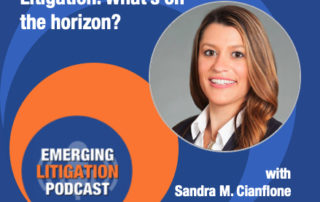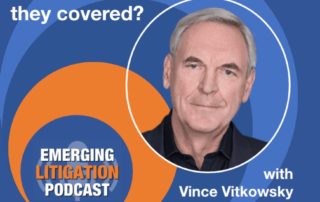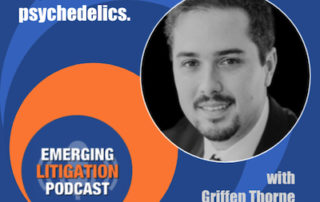Emerging Litigation Podcast
Sandra Cianflone on Current and Emerging COVID-19 Litigation
Sandra Cianflone on COVID-19 Litigation in 2021 and Beyond It’s now been more than 18 months since the world was besieged by the novel coronavirus pandemic. In addition to the human toll, it disrupted our lives in ways big and small, new and old, as it raced across continents, first visiting North America in January 2020. There are an estimated 15,000 lawsuits relating to the outbreak, with some 350 filings directed toward the healthcare and medical communities. The number of insurance coverage suits is fast-approaching 1,800. Litigation has been initiated against aging services, hospitals, and healthcare providers, with the next anticipated wave likely to surround vaccines themselves. What will be the basis of these claims? What defenses will we see? And what can healthcare providers do now in anticipation of this onslaught? Joining me to discuss this out-of-the-blue rash of litigation is Sandra M. Cianflone of Hall Booth Smith, P.C. Sandie counsels and defends hospitals, physicians, nurses and institutional employees in a broad spectrum of catastrophic injury and medical malpractice cases. She received her Juris Doctorate from Pace University School of Law and her undergraduate degree from Fairleigh Dickinson University. This podcast is the audio companion to the Journal on Emerging Issues in Litigation, a collaborative project between HB Litigation Conferences and the Fastcase legal research family, which includes Full Court Press, Law Street Media, Docket Alarm and, most recently, Judicata. If you have comments or wish to participate in one our projects, or want to tell me how insightful and informative Sandie is, please drop me a note at Editor@LitigationConferences.com. This podcast is based on an article she wrote for the forthcoming issues of the Journal. I hope you enjoy the interview, and especially a brief story (after we wrap up) about Sandie's experience delivering a baby in the Age of COVID-19. I also mangled a bit of basic Spanish, for which I am ashamed (lo [...]
Vince Vitkowsky on Insurance Coverage for Civil Unrest
Vince Vitkowsky on Insurance Coverage for Civil Unrest Civil unrest. Peaceful protests. Massive marches. Riots. Looting. Which of these things are not like the other? Recent social outrage over police shootings of Black people -- these events in particular -- have sent people to the streets by hundreds of thousands. In some cases these constitutionally protected activities are followed by property damage, injury and death. Observers continue to debate who is responsible for the violence. Whatever the answer, as a very practical matter, someone has to pay for the property damage. Join me for my conversation with Vince Vitkowsky of Gfeller Laurie LLP. Vince possesses deep knowledge of insurance coverage matters, representing carriers in a variety of areas, e.g. cyber risk, data privacy, general liability, directors and officers liability, health, and more. He combines his experience as a veteran insurance and reinsurance lawyer with a strong background in terrorism and national security law. This podcast is the audio companion to the Journal on Emerging Issues in Litigation, a collaborative project between HB Litigation Conferences and the Fastcase legal research family, which includes Full Court Press, Law Street Media, Docket Alarm and, most recently, Judicata. If you have comments or wish to participate in one our projects, or want to tell me how insightful and informative Vince is , please drop me a note at Editor@LitigationConferences.com. I hope you enjoy the interview, and how deftly we obscured the fact that Vince lives in New York City.
Psychedelics Decriminalization and Regulation with Griffen Thorne
Psychedelics Decriminalization and Regulation with Griffen Thorne Listen to my interview with Griffen Thorne, an attorney in the Los Angeles office of Harris Bricken LLP. He focuses on corporate, transactional, intellectual property, data security, regulatory, and litigation matters across a wide variety of domestic and international industries. As part of Harris Bricken’s corporate cannabis team, he works closely with cannabis and hemp clients, whom he advises on obtaining licenses and permits, regulatory compliance, entity formation and structuring, mergers and acquisitions, corporate governance issues, contract drafting and negotiation, obtaining and protecting intellectual property rights, and administrative appeals and litigation. He also represents clients throughout a wide range of industries regarding compliance with United States, European, and Asian Internet, technology, and data security laws and regulations. We hope you enjoy the interview. Tom Hagy Send questions or comments to Editor@LitigationConferences.com. What does the future hold for psychedelics in America? How are states approaching the ownership and use of these drugs, either for recreational or their controlled therapeutic use?
A Shameless Plug for Our Content Services
Your content marketing is everything you’ve ever dreamed of. Right?

Critical Legal Content was founded by Tom Hagy, former Editor & Publisher of Mealey’s Litigation Reports and VP at LexisNexis, founder of HB, current litigation podcaster and editor-in-chief. CLC’s mission is to help smaller firms and service providers not only create content — blogs, articles, papers, webinars, podcasts (like the stuff on this site) — but also to get it out there. How? Via social media, this website, your website, and potential via our podcast and journal which we publish in collaboration with vLex Fastcase and Law Street Media. The goal is to attract readers and dizzy them with your brilliance.
*Inspired by actual events.
Create content like a real legal publisher.













